Dr. Brian J. Harvey, Principal Investigator
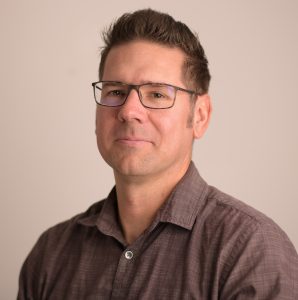 Dr. Brian J. Harvey is the Jack Corkery and George Corkery Jr. Endowed Professor in Forest Sciences and Associate Professor in the School of Environmental and Forest Sciences in the College of the Environment at the University of Washington. His research focuses on understanding the patterns and drivers of forest fires – and how forest structure and function is shaped by fires, interactions among fire and other disturbances (e.g., insect outbreaks), and climate. Dr. Harvey’s work emphasizes field studies that are integrated with large spatial datasets and analyses, drawing on insights from landscape ecology, fire ecology, disturbance ecology, and community ecology in forest ecosystems. Over the last 15 years, he has conducted research on the fire ecology of forests in coastal California, the US Rocky Mountains, and the Pacific Northwest. From 2015 to 2017, Dr. Harvey was a David H. Smith Postdoctoral Research Fellow at the University of Colorado-Boulder. In 2015, he completed his PhD in the Department of Integrative Biology (formerly Zoology) at the University of Wisconsin-Madison. Prior to that, he completed his Masters degree in the Department of Geography at San Francisco State University in 2010, and in 2003 earned Bachelors degrees (double major) in the Departments of Geography and Environmental Studies at the University of California – Santa Barbara. Prior to pursuing a career in research, Dr. Harvey worked in the private sector as an environmental consultant and project manager. In addition to his research at UW, he teaches graduate- and undergraduate-level courses in the School of Environmental and Forest Sciences.
Dr. Brian J. Harvey is the Jack Corkery and George Corkery Jr. Endowed Professor in Forest Sciences and Associate Professor in the School of Environmental and Forest Sciences in the College of the Environment at the University of Washington. His research focuses on understanding the patterns and drivers of forest fires – and how forest structure and function is shaped by fires, interactions among fire and other disturbances (e.g., insect outbreaks), and climate. Dr. Harvey’s work emphasizes field studies that are integrated with large spatial datasets and analyses, drawing on insights from landscape ecology, fire ecology, disturbance ecology, and community ecology in forest ecosystems. Over the last 15 years, he has conducted research on the fire ecology of forests in coastal California, the US Rocky Mountains, and the Pacific Northwest. From 2015 to 2017, Dr. Harvey was a David H. Smith Postdoctoral Research Fellow at the University of Colorado-Boulder. In 2015, he completed his PhD in the Department of Integrative Biology (formerly Zoology) at the University of Wisconsin-Madison. Prior to that, he completed his Masters degree in the Department of Geography at San Francisco State University in 2010, and in 2003 earned Bachelors degrees (double major) in the Departments of Geography and Environmental Studies at the University of California – Santa Barbara. Prior to pursuing a career in research, Dr. Harvey worked in the private sector as an environmental consultant and project manager. In addition to his research at UW, he teaches graduate- and undergraduate-level courses in the School of Environmental and Forest Sciences.
Research Interests: fire ecology, forest ecology, disturbance ecology, landscape ecology, western conifer forests
Contact: email – bjharvey@uw.edu; tel – (206) 685-9929; Office – Bloedel Hall 396; Lab – Bloedel Hall 340
Curriculum Vitae| Google Scholar | Twitter | SEFS Faculty Profile
–
CURRENT LAB MEMBERS (alphabetical order):
Dr. Kristin H. Braziunas, Research Scientist
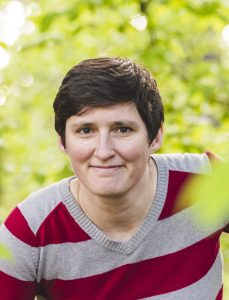
Dr. Kristin Braziunas is a research scientist in the Harvey Lab at UW-SEFS. Her work focuses on understanding forest and disturbance dynamics in the face of climate change, with an emphasis on mountain landscapes in the western United States and European Alps. Prior to her current position, she was a postdoctoral researcher with the Ecosystem Dynamics and Forest Management Group at the Technical University of Munich. There, she primarily worked on forest landscape model development, specifically adding a new microclimate temperature module and developing methods for projecting future forest understory plant distributions from model outputs. Dr. Braziunas earned a PhD (2021) and MS (2018) in Integrative Biology from the University of Wisconsin-Madison and a BA (2008) in Environmental Studies from Oberlin College. Her graduate work examined how forests and fuels recover after more frequent fire, as well as how fuels treatments alter fire risk and ecosystem services in wildland urban interface landscapes, using a blend of field work, forest simulation modeling, and remote sensing methods. Between undergraduate and graduate school, Dr. Braziunas worked for eight years in sustainability planning and program management, and she was a firefighter/emergency medical technician with the Oberlin Fire Department, where she achieved the rank of Lieutenant.
Research Interests: landscape ecology, forest ecology, disturbance ecology, wildfire management, social-ecological systems, process-based models
Contact: email – kbraziun@uw.edu; tel – (206) 616-1299; Office – Bloedel Hall 203
Curriculum Vitae | Google Scholar | website | GitHub
–
Dr. Michele S. Buonanduci, Postdoctoral researcher jointly with the Nature Conservancy
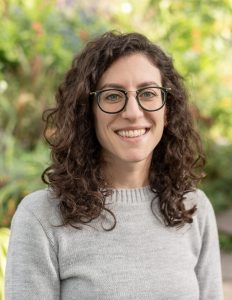
Dr. Michele Buonanduci is a postdoctoral researcher jointly appointed at the Nature Conservancy and the Harvey Lab at UW-SEFS. Broadly, she is interested in harnessing quantitative methods to address both basic and applied ecological questions. Michele completed her M.S. and Ph.D. in the Harvey Lab through the Quantitative Ecology and Resource Management (QERM) program at UW. Her graduate research focused on understanding the causes and consequences of forest disturbances (primarily bark beetle outbreaks and wildfires) across a range of spatial scales. As a Postdoctoral Researcher, Michele is working to quantify how fire regimes are changing across the western US and to better understand the implications of those changes for Pacific salmon population health.
Research Interests: landscape ecology, forest ecology, spatial and statistical analysis
Contact: email – mbuon@uw.edu; tel – (206) 616-1879; Office – Bloedel Hall 340
Curriculum Vitae | Google Scholar | website
–
Dr. Tao Huang, Postdoctoral researcher
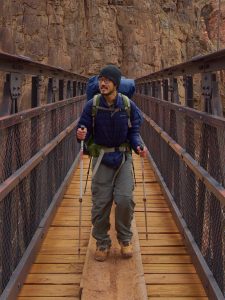 Dr. Tao Huang is a postdoctoral researcher in the Harvey Lab, where he studies how multiple disturbances affect forest ecosystem services. He earned his PhD from Boise State University and his MS from the University of New Hampshire. His research interests include ecosystem dynamics and spatial ecology across both terrestrial and aquatic systems, and he uses ecosystem modeling to study disturbance ecology. A core component of his PhD was integrating remote sensing imagery and ground surveys with machine learning classifiers to map vegetation cover. Before moving to Seattle, I conducted field and modeling work from semi-arid sagebrush dominated Northern Great Basin ecoregion to Northeastern coastal watersheds. Between degrees he served in the military of Taiwan and worked as a Data Analyst at Cary Institute of Ecosystem Studies. In his free time, he likes climbing, birding, and hiking.
Dr. Tao Huang is a postdoctoral researcher in the Harvey Lab, where he studies how multiple disturbances affect forest ecosystem services. He earned his PhD from Boise State University and his MS from the University of New Hampshire. His research interests include ecosystem dynamics and spatial ecology across both terrestrial and aquatic systems, and he uses ecosystem modeling to study disturbance ecology. A core component of his PhD was integrating remote sensing imagery and ground surveys with machine learning classifiers to map vegetation cover. Before moving to Seattle, I conducted field and modeling work from semi-arid sagebrush dominated Northern Great Basin ecoregion to Northeastern coastal watersheds. Between degrees he served in the military of Taiwan and worked as a Data Analyst at Cary Institute of Ecosystem Studies. In his free time, he likes climbing, birding, and hiking.
Research Interests: remote sensing, landscape ecology, hydrology, ecosystem management
Contact: email – taohuang@uw.edu; office – Bloedel Hall 340
Curriculum Vitae | Google Scholar | Bluesky
–
Madison M. Laughlin, PhD candidate
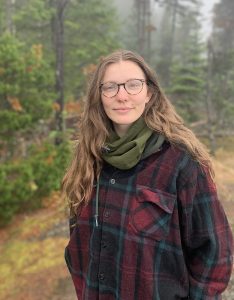 Madison Laughlin is a PhD candidate in the Harvey Lab studying forest and fire ecology in the Pacific Northwest. Her current research is examining potential mechanisms of in-situ conifer seed availability following wildfire in northwestern Cascadia. Madison graduated from Northland College with a B.S. in Natural Resources and Geology in 2018 and completed her M.S. in Environmental and Forest Sciences with the Harvey Lab in 2022 where she examined the patterns and drivers of early conifer regeneration following stand-replacing wildfire in northwestern Cascadia. During her free time, Madison enjoys live music, playing guitar, caring for her house plants, biking, and looking at rocks.
Madison Laughlin is a PhD candidate in the Harvey Lab studying forest and fire ecology in the Pacific Northwest. Her current research is examining potential mechanisms of in-situ conifer seed availability following wildfire in northwestern Cascadia. Madison graduated from Northland College with a B.S. in Natural Resources and Geology in 2018 and completed her M.S. in Environmental and Forest Sciences with the Harvey Lab in 2022 where she examined the patterns and drivers of early conifer regeneration following stand-replacing wildfire in northwestern Cascadia. During her free time, Madison enjoys live music, playing guitar, caring for her house plants, biking, and looking at rocks.
Research Interests: forest ecology, forest structural development, fire and disturbance ecology, climate resilience
Contact: email – laughmad@uw.edu; tel – (206) 616-1879; Office – Bloedel Hall 340
Curriculum Vitae | Google Scholar
–
Angie G. Liotta, PhD candidate
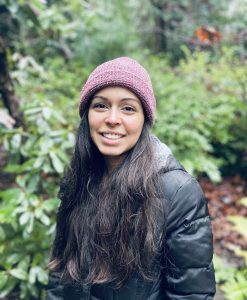 Angie G. Liotta is a PhD candidate in the Harvey Lab interested in the impacts of disturbance regimes and climate on forest regeneration and fecundity. Her current work examines post-fire forest successional processes in the eastern Cascades. Angie earned her M.S. in Forest Sciences at Colorado State University, where her research focused on the impact of drought on resource allocation patterns during mast years in ponderosa pine woodlands across the Colorado Front Range. She earned her B.A. in Geography at the University of Colorado – Boulder. During her time at CU Boulder, her research focused on tree mortality in the subalpine and post-fire regeneration in the lower montane. In her spare time, Angie likes to bake, cook, paddleboard, and will find any excuse to be outdoors.
Angie G. Liotta is a PhD candidate in the Harvey Lab interested in the impacts of disturbance regimes and climate on forest regeneration and fecundity. Her current work examines post-fire forest successional processes in the eastern Cascades. Angie earned her M.S. in Forest Sciences at Colorado State University, where her research focused on the impact of drought on resource allocation patterns during mast years in ponderosa pine woodlands across the Colorado Front Range. She earned her B.A. in Geography at the University of Colorado – Boulder. During her time at CU Boulder, her research focused on tree mortality in the subalpine and post-fire regeneration in the lower montane. In her spare time, Angie likes to bake, cook, paddleboard, and will find any excuse to be outdoors.
Research Interests: forest regeneration, disturbance ecology, climate resilience
Contact: email – agonza29@uw.edu; tel – (206) 616-1879; Office – Bloedel Hall 340
Curriculum Vitae | LinkedIn | Google Scholar | Twitter
–
Mia E. Mitchell, PhD student
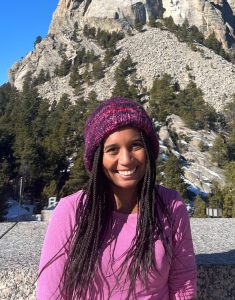 Mia Mitchell is a PhD student in the Harvey Lab interested in forest resilience, fire ecology, post-fire forest trajectories, and interrogating equilibrium states. Mia graduated from Brown University with a BSc in Environmental Science (Conservation Science and Policy). During her undergraduate studies, she spent time at the Smithsonian Tropical Research Institute, quantifying canopy disturbances and landscape-level dynamics with drone photogrammetry on Barro Colorado Island. After undergraduate, she worked as a post-baccalaureate researcher at Los Alamos National Laboratory in the Earth and Environmental Sciences Division. As a postbaccalaureate researcher, she quantified forest structure from remote sensing images using deep learning. She is excited to continue developing quantitative skills and learn more about fires in the PNW! During her free time, she enjoys hiking and backpacking, playing guitar, soccer, and watching movies.
Mia Mitchell is a PhD student in the Harvey Lab interested in forest resilience, fire ecology, post-fire forest trajectories, and interrogating equilibrium states. Mia graduated from Brown University with a BSc in Environmental Science (Conservation Science and Policy). During her undergraduate studies, she spent time at the Smithsonian Tropical Research Institute, quantifying canopy disturbances and landscape-level dynamics with drone photogrammetry on Barro Colorado Island. After undergraduate, she worked as a post-baccalaureate researcher at Los Alamos National Laboratory in the Earth and Environmental Sciences Division. As a postbaccalaureate researcher, she quantified forest structure from remote sensing images using deep learning. She is excited to continue developing quantitative skills and learn more about fires in the PNW! During her free time, she enjoys hiking and backpacking, playing guitar, soccer, and watching movies.
Research Interests: forest ecology, fire and disturbance ecology, landscape ecology, climate resilience, remote sensing
Contact: email – miashell@uw.edu; tel – (206) 616-1879; Office – Bloedel Hall 340
Curriculum Vitae | Google Scholar | website
–
Dr. Jenna E. Morris, Postdoctoral researcher
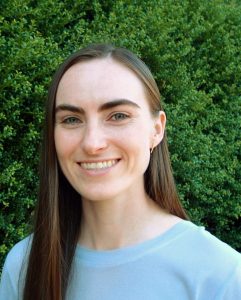
Dr. Jenna Morris (she/her) is a postdoctoral researcher in the Harvey Lab at UW-SEFS. She is passionate about actionable science for sustainable resource management and climate adaptation in terrestrial ecosystems. Her current work uses simulation modeling approaches to understand how fire regimes and forest resilience to fire are changing across the Pacific Northwest. Jenna earned her PhD (2025) and MS (2020) in Environmental and Forest Sciences from UW, and a BS (2017) in Biology from Whitworth University. Her graduate work leveraged field studies, permanent plot networks, and landscape modeling to explore the effects of disturbances (fire, insect outbreaks) on forest structure and function across the Pacific Northwest and Rocky Mountains. Prior to graduate school, Jenna worked as a botany field technician for the National Ecological Observatory Network (NEON). In her free time, Jenna enjoys wandering outdoors, trying new recipes, and the beautiful game.
Research Interests: disturbance ecology, climate adaptation, forest ecology, actionable science
Contact: email – jemorris@uw.edu; tel – (206) 616-1879; Office – Bloedel Hall 340
Curriculum Vitae | Google Scholar | Bluesky
–
Liliana K. Rangel-Parra, PhD student
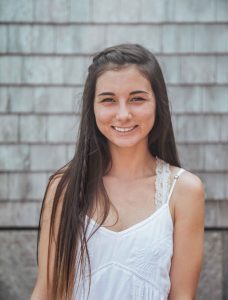 Liliana Rangel-Parra is a PhD student in the Harvey Lab, where her current research examines post-fire early-seral plant community dynamics in western Cascadia forests. She earned her B.S. (with Honors) in Ecological, Environmental, and Evolutionary Biology in spring of 2020 from Appalachian State University. Her undergraduate thesis examined the ecophysiology of broad-leaved evergreen shrubs under rapidly changing environmental conditions. She conducted an NSF Research Experience for Undergraduates (REU) with the Roberson Lab in summer of 2018 at the Marine Biological Laboratory, where her research investigated coral-algal symbioses under stressful conditions. During her international studies in Costa Rica, New Zealand, and Australia, her passion for ecological research, scientific communication, and collaborative work with local communities in forested ecosystems grew. Outside of school, Liliana enjoys snowboarding, crafting, and spending time with her lizard, Marley.
Liliana Rangel-Parra is a PhD student in the Harvey Lab, where her current research examines post-fire early-seral plant community dynamics in western Cascadia forests. She earned her B.S. (with Honors) in Ecological, Environmental, and Evolutionary Biology in spring of 2020 from Appalachian State University. Her undergraduate thesis examined the ecophysiology of broad-leaved evergreen shrubs under rapidly changing environmental conditions. She conducted an NSF Research Experience for Undergraduates (REU) with the Roberson Lab in summer of 2018 at the Marine Biological Laboratory, where her research investigated coral-algal symbioses under stressful conditions. During her international studies in Costa Rica, New Zealand, and Australia, her passion for ecological research, scientific communication, and collaborative work with local communities in forested ecosystems grew. Outside of school, Liliana enjoys snowboarding, crafting, and spending time with her lizard, Marley.
Research Interests: forest ecology, disturbance ecology, physiological ecology, climate resilience
Contact: email – lkrp@uw.edu; tel – (206) 616-1879; Office – Bloedel Hall 340
–
Dr. Crystal L. Raymond, Research Scientist & Deputy Director – Western Fire and Forest Resilience Collaborative
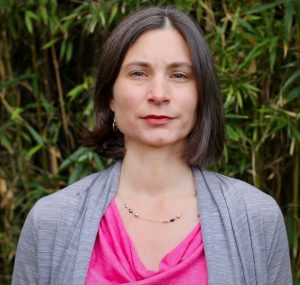
Dr. Crystal Raymond is a research scientist in the Harvey Lab at UW-SEFS and is the Deputy Director of Policy and Management for the Western Fire and Forest Resilience Collaborative. Crystal has a MS and PhD in fire ecology from University of Washington. Since completing her graduate studies, she has spent 15 years working at the boundary of science and management holding positions in local government, federal government, and most recently as a Climate Adaptation Specialist with the Climate Impacts Group at University of Washington. There she co-produced research on climate impacts, vulnerability, and adaptation with decision-makers, practitioners, and natural resource managers across the Pacific Northwest. Crystal’s role in the Western Fire and Forest Resilience Collaborative is to connect the science of the collaborative with the needs of decision makers and resource managers. She leads stakeholder engagement and develops broader management and policy implications of the team’s research. She hopes to amplify the impact of the Collaborative to move society towards living more sustainably with fire.
Research Interests: fire ecology, forest ecology, climate adaptation, fire and forest policy and management
Contact: email – crlfire@uw.edu; tel – (206) 616-4304; Office – Bloedel Hall 203
Curriculum Vitae | Google Scholar
–
Sofia Saenz Kruszka, MS student
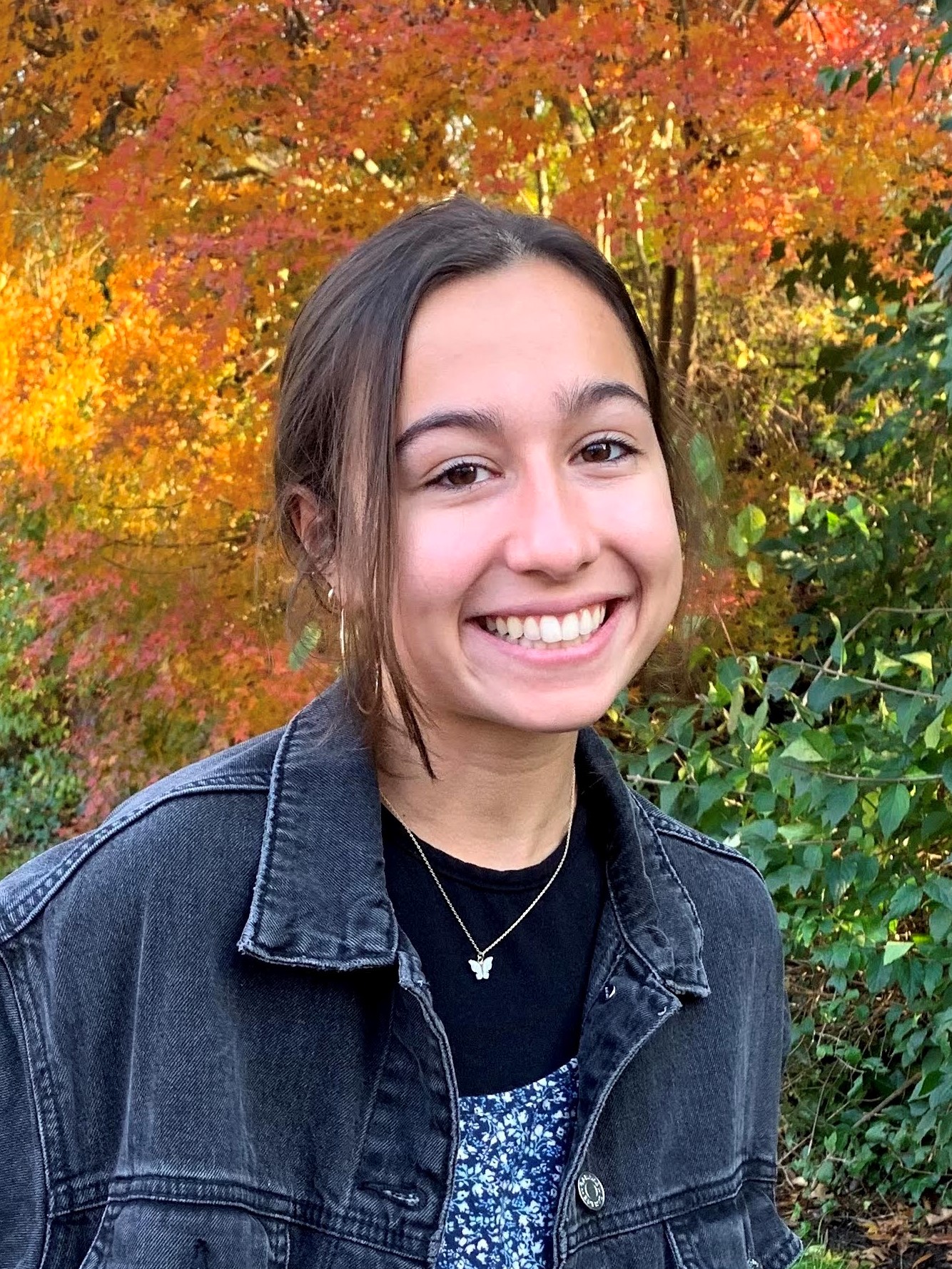 Sofia Saenz Kruszka is a MS student in the Harvey lab in the School of Environmental and Forest Sciences at the University of Washington. She earned her B.S. (with Distinction) in ecology, evolution, and biodiversity from the University of Michigan in Ann Arbor in 2021. Prior to joining the lab, Sofia spent a summer working as a field technician for the Harvey lab in western Cascadia and Point Reyes, California. After her first field season out west, she became fascinated with the effects of fire disturbance on forest dynamics. In her free time, Sofia enjoys being outdoors, watching TV, and cooking.
Sofia Saenz Kruszka is a MS student in the Harvey lab in the School of Environmental and Forest Sciences at the University of Washington. She earned her B.S. (with Distinction) in ecology, evolution, and biodiversity from the University of Michigan in Ann Arbor in 2021. Prior to joining the lab, Sofia spent a summer working as a field technician for the Harvey lab in western Cascadia and Point Reyes, California. After her first field season out west, she became fascinated with the effects of fire disturbance on forest dynamics. In her free time, Sofia enjoys being outdoors, watching TV, and cooking.
Research Interests: forest ecology, landscape ecology, fire disturbance, climate resilience
Contact: email – sofikru@uw.edu; tel – (206) 616-1879; Office – Bloedel Hall 340
–
–
–
LAB ALUMNI (reverse chronological order):
Graduate students and postdoctoral researchers
Dr. Don C. Radcliffe, PhD student (2018-2024); Postdoctoral researcher (2024-2025)
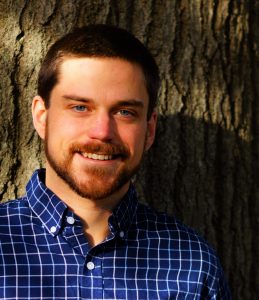
Dr. Don Radcliffe completed his PhD and then continued as a postdoctoral researcher in the Harvey Lab in the School of Environmental and Forest Sciences at UW. He studies the effects of fuels reduction treatments and wildfire on ecosystem function and temporal dynamics of fuel accumulation. Don earned his Ph.D. in the Harvey Lab at UW-SEFS in 2024, where his research focused on the long-term effects of fuel treatments in dry forests if the interior Pacific Northwest. Don earned his M.S. from The Ohio State University, where his research focused on modelling maple regeneration and oak mortality in mature oak forests of Appalachian Ohio. He earned his B.S. at the University of Wisconsin – Madison, where he double majored in forest science and life sciences communication. In between his bachelor’s and master’s degrees, Don worked for the US Forest Service in northwest Montana, the Society of American Foresters near Washington D.C., and his parents’ construction company in Wisconsin. In his spare time, Don likes to go rock climbing, cycling, snowboarding, and birding. Dr. Radcliffe is currently an assistant professor of forest ecology at Paul Smith’s College in the Adirondack Mountains, NY.
Research Interests: Forest ecology, landscape ecology, disturbance, management, wildlife
Contact: email – dradclif@uw.edu
Curriculum Vitae| Google Scholar
–
Dr. Michelle C. Agne, PhD student from 2017 to 2022
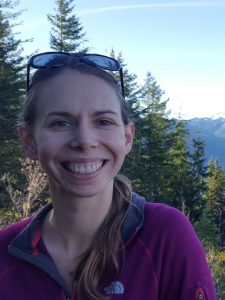
Dr. Michelle Agne completed her PhD in the Harvey lab in the School of Environmental and Forest Sciences at the University of Washington and also in the Terrestrial Ecology Research Group in the School of Veterinary and Life Sciences at Murdoch University. Michelle earned her B.S. in Environmental Science from Western Washington University in 2009, and completed her M.S. in Sustainable Forest Management at Oregon State University in 2013. Following the completion of her master’s degree, Michelle spent four years working as a faculty research assistant in the Forest Health Lab at Oregon State. During this time, she worked on a variety of research that focused on interactions among forest insects, forest pathogens, fire, and management in the forests of coastal and central Oregon. Michelle’s PhD research focused broadly on changing disturbance regimes in serotinous forests, and their impacts on structure, composition, and function. When Michelle isn’t in class or working on her research, you might find her riding her bike around the city, reading fiction, rainy day hiking, or playing board games with friends. Dr. Agne is currently a ORISE Postdoctoral Fellow with the US Forest Service – Pacific Northwest Research Station in Olympia, WA.
Research Interests: Forest ecology, climate change, insect outbreaks, forest pathogens, fire ecology
Current contact: email – Michelle.Agne@usda.gov
Curriculum Vitae | Google Scholar
–
Saba J. Saberi, MS student from 2017 to 2019
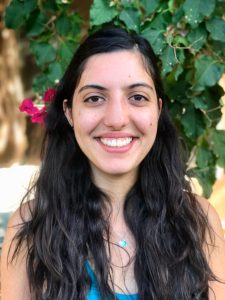
Saba Saberi completed her MS degree in the Harvey Lab in the School of Environmental and Forest Sciences at UW. She earned her BS in Environmental Science from the College of Natural Resources at University of California, Berkeley in the spring of 2017, where she completed an honors thesis entitled “Remote Sensing of Global Lake Gross Primary Production.” Saba’s MS research combined field studies of burn severity with satellite indices to better understand how forests of the western United States are affected by disturbance, especially within the contexts of climate change and forest management. After completing her MS, Saba worked as a research analyst with the Precision Forestry Cooperative in SEFS. A Southern California native, Saba is excited to live in and study the forests of the Pacific Northwest. Currently, Saba is a PhD student at University of California – Davis, studying fire ecology in the Sierra Nevada mountains.
Research Interests: Remote sensing, forest ecology, climate change, GIS, management
Current contact: email – sjsaberi@ucdavis.edu
–
–
Undergraduate Capstone Research Students
Christian Rolfson (2023 – 2024)
Christian Rolfson earned his BS at the University of Washington’s School of Environmental and Forest Sciences in 2024, majoring in Environmental Science and Terrestrial Resource Management. Christian worked on the Harvey Lab’s summer field crew in 2022 and completed his capstone project under PhD student Madison Laughlin. His capstone work explored variability of fire effects within and among stands burned at low severity across northwestern Cascadia.
(Photo coming soon)
–
Sienna Patton (2022 – 2023)
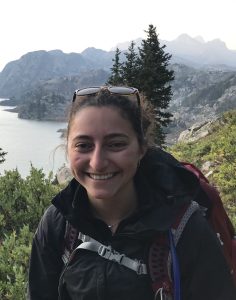 Sienna Patton earned her BS at the University of Washington’s School of Environmental and Forest Sciences, majoring in Environmental Science and Terrestrial Resource Management with honors in the spring of 2023. Sienna worked on the Harvey Lab’s summer field crew in 2020 after her freshman year, and returned her senior year to work on a capstone project under PhD student Jenna Morris. Her capstone work investigated how pre-fire stand conditions and topographic factors influence shrub biomass accumulation following severe fire in Northwestern Cascadia. Sienna plans to either pursue a career that will help further reforestation efforts, or work as an environmental consultant. Besides learning about forests, Sienna enjoys backpacking, playing ultimate frisbee, biking, jumping in cold lakes, and playing guitar.
Sienna Patton earned her BS at the University of Washington’s School of Environmental and Forest Sciences, majoring in Environmental Science and Terrestrial Resource Management with honors in the spring of 2023. Sienna worked on the Harvey Lab’s summer field crew in 2020 after her freshman year, and returned her senior year to work on a capstone project under PhD student Jenna Morris. Her capstone work investigated how pre-fire stand conditions and topographic factors influence shrub biomass accumulation following severe fire in Northwestern Cascadia. Sienna plans to either pursue a career that will help further reforestation efforts, or work as an environmental consultant. Besides learning about forests, Sienna enjoys backpacking, playing ultimate frisbee, biking, jumping in cold lakes, and playing guitar.
Research interests: Forest ecology, carbon sequestration, climate change resilience, ecosystem quantification
Contact: email – sienna.patton@outlook.com
–
Mark Elbrecht (2021 – 2022)
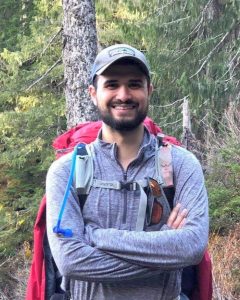 Mark Elbrecht earned his BS at the University of Washington’s School of Environmental and Forest Sciences, majoring in Environmental Science and Terrestrial Resource Management. He graduated in winter 2022 with honors. His senior capstone thesis in the Harvey Lab under Don Radcliffe examined the long-term impact of fuel treatments on forest stand structure and resiliency in the dry forests of the eastern Cascades. Post-graduation, Mark joined the Harvey lab’s 2022 summer field crew. He hopes to pursue graduate school in the future to further study forest and disturbance ecology. In the meantime, Mark enjoys hiking, camping, backpacking, reading, and board games.
Mark Elbrecht earned his BS at the University of Washington’s School of Environmental and Forest Sciences, majoring in Environmental Science and Terrestrial Resource Management. He graduated in winter 2022 with honors. His senior capstone thesis in the Harvey Lab under Don Radcliffe examined the long-term impact of fuel treatments on forest stand structure and resiliency in the dry forests of the eastern Cascades. Post-graduation, Mark joined the Harvey lab’s 2022 summer field crew. He hopes to pursue graduate school in the future to further study forest and disturbance ecology. In the meantime, Mark enjoys hiking, camping, backpacking, reading, and board games.
Research Interests: Forest ecology, disturbance ecology, sustainable forest management, climate change
Contact: email – melbrecht@gmail.com
–
–
Maddy Stone (2020 – 2021)
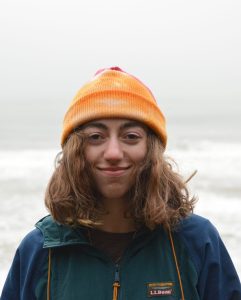 Maddy Stone earned her BS at the University of Washington’s School of Environmental and Forest Sciences, majoring in Environmental Science and Terrestrial Resource Management. Her senior capstone thesis in the Harvey Lab analyzed the comparative difference of microsite and competition on seedling growth in post-fire knobcone pine stands in southern Oregon and northern California. Maddy is interested in fire severity mosaics, post-fire regeneration, forest ecology, and competition. After graduating in the spring, Maddy joined the Harvey Lab’s 2021 summer field crew. Her next step is to pursue a graduate degree in fire ecology and ecosystem management, with a focus on serotinous forests. In the meantime, she has been expanding her coding skills, working, and spending time outdoors where she enjoys climbing, skiing, and hiking!
Maddy Stone earned her BS at the University of Washington’s School of Environmental and Forest Sciences, majoring in Environmental Science and Terrestrial Resource Management. Her senior capstone thesis in the Harvey Lab analyzed the comparative difference of microsite and competition on seedling growth in post-fire knobcone pine stands in southern Oregon and northern California. Maddy is interested in fire severity mosaics, post-fire regeneration, forest ecology, and competition. After graduating in the spring, Maddy joined the Harvey Lab’s 2021 summer field crew. Her next step is to pursue a graduate degree in fire ecology and ecosystem management, with a focus on serotinous forests. In the meantime, she has been expanding her coding skills, working, and spending time outdoors where she enjoys climbing, skiing, and hiking!
Research Interests: Fire ecology, serotiny, disturbance ecology, landscape ecology, ecosystem management
Contact: email – maddystone14@yahoo.com
–
Michael McNorvell (2019 – 2020)
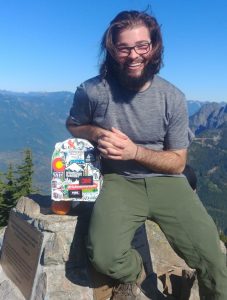 Michael McNorvell earned his BS at the University of Washington’s School of Environmental and Forest Sciences, majoring in Environmental Science and Terrestrial Resource Management. His senior capstone thesis in the Harvey Lab analyzed tree-level mortality response of conifer species to wildfire in the western Cascades. Fascinated by leaf-to-landscape factors of disturbance ecology, Michael is interested in how fire influences forest dynamics from multiple scales and perspectives, including soil ecology, tree regeneration, and natural resource management. In the future, he hopes he can study disturbance ecology to aid in restoring resistance and resilience to fire in dry-forest ecosystems. After graduating in the spring, Michael continued field work with the Harvey Lab, and hopes to pursue graduate school to further study fire ecology and ecosystem management. When he isn’t conquering hills or climbing trees for science, Michael enjoys hiking good mountains, climbing good rocks, playing good music, and cooking good food for fun!
Michael McNorvell earned his BS at the University of Washington’s School of Environmental and Forest Sciences, majoring in Environmental Science and Terrestrial Resource Management. His senior capstone thesis in the Harvey Lab analyzed tree-level mortality response of conifer species to wildfire in the western Cascades. Fascinated by leaf-to-landscape factors of disturbance ecology, Michael is interested in how fire influences forest dynamics from multiple scales and perspectives, including soil ecology, tree regeneration, and natural resource management. In the future, he hopes he can study disturbance ecology to aid in restoring resistance and resilience to fire in dry-forest ecosystems. After graduating in the spring, Michael continued field work with the Harvey Lab, and hopes to pursue graduate school to further study fire ecology and ecosystem management. When he isn’t conquering hills or climbing trees for science, Michael enjoys hiking good mountains, climbing good rocks, playing good music, and cooking good food for fun!
Research Interests: Forest ecology, fire ecology, disturbance ecology, soil ecology, ecosystem management
Contact: email – michael@mcnorvell.com
–
Ashley Hillis (2019 – 2020)
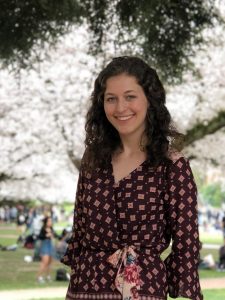 Ashley Hillis completed her BS in the Environmental Science and Resource Management (ESRM) major in the School of Environmental and Forest Sciences at the University of Washington. With a focus on forest management, she graduated in spring 2020 with honors. Ashley completed a capstone project in the Harvey Lab, working with Michelle Agne and Brian Harvey, where she examined the reproductive capacity (seed counts and viability) in cones of a serotinous conifer. After graduation from UW, Ashley is interested in pursuing graduate school in the field of forest ecology and disturbance ecology.
Ashley Hillis completed her BS in the Environmental Science and Resource Management (ESRM) major in the School of Environmental and Forest Sciences at the University of Washington. With a focus on forest management, she graduated in spring 2020 with honors. Ashley completed a capstone project in the Harvey Lab, working with Michelle Agne and Brian Harvey, where she examined the reproductive capacity (seed counts and viability) in cones of a serotinous conifer. After graduation from UW, Ashley is interested in pursuing graduate school in the field of forest ecology and disturbance ecology.
Research Interests: serotiny, wildfire, forest management, old-growth and subalpine forest
Contact: email – ashleyhillis2020@gmail.com
–
–
–
Young-Eui Oh (2018 – 2019)
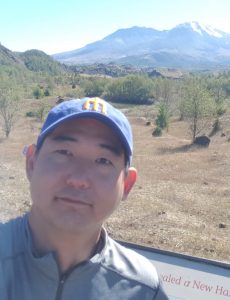
Young Oh completed his undergraduate studies in the Environmental Sciences and Resource Management program in the College of the Environment at UW and recently graduated with his B.S. in ESRM and B.A. in Economics in August 2019. After completion of his undergraduate studies, he is pursuing his master’s in Environmental Science in Indiana University Bloomington. While attending UW, he studied various effects of disturbance in forest and soil. He enjoys hiking, watching baseball and movie, when he is not studying. Young completed his capstone project in SEFS and was co-advised by Dr.s Brian Harvey and Britt Johnson.
Research Interests: Forest ecology, soil, below-ground ecosystem, disturbance
Contact: email – oh02@uw.edu
–
–
–
Jalene Weatherholt (2018 – 2019)
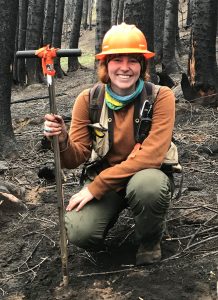
Jalene completed her undergraduate degree in the School of Environmental and Forest Sciences with a capstone looking at data collected in the 2018 field season. Her research interests encompass the connection between soils, wildfire disturbance, and forest management. This fascination translated perfectly into her capstone research with the Harvey Lab (co-advised by Britt Johnson in SEFS) analyzing post-fire soil conditions of fires across the Pacific Northwest. Jalene observed soil hydrophobicity and other soil burn severity measurements so as to compare characteristics of above ground burn severity indicators with below ground conditions. She is now continuing this research as a masters student in the School of Environmental and Forest Sciences.
Research Interests: soils, wildfire, disturbance, forest management
Contact: email – jweath19@uw.edu
–
–
Luke J. Semler (2017 – 2018)
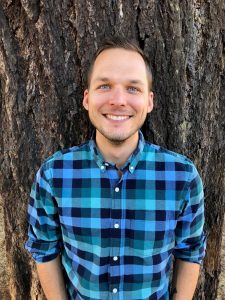
Luke Semler is an undergraduate student in the Harvey Lab in the School of Environment and Forest Sciences at the University of Washington where he is earning a Bachelor of Science in Sustainable Forest Management. After completion of his undergraduate studies this year, he is interested in pursuing his Master’s in subalpine forest ecology. Prior to his time at UW and returning home to the Pacific Northwest, Luke served with the United States Air Force. When he’s not studying, Luke enjoys hiking, snowboarding, and mountaineering.
Research Interests: Forest ecology and management, tree mortality, remote sensing, mycorrhizal relationships
Contact: email – lsemler@uw.edu
–
–
Amber Noble (2017 – 2018)
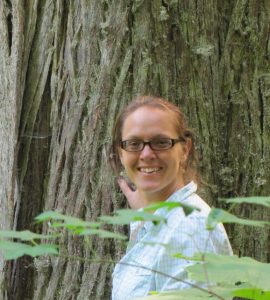
Amber is a Senior in the Environmental Sciences and Resource Management program in the College of the Environment at UW and plans to graduate with her B.S. in June 2018. Her focus while attending UW includes forest restoration and management based on ecological forestry practices. She is interested in applying these practices to the Pacific Northwest forests for sustained timber harvesting while maintaining the integrity of the ecosystem services. Amber enjoys hiking, biking, reading, learning about trees, and spending time with friends.
Research Interests: forest ecology, sustainable forest management
Contact: email – anoble11@uw.edu
–
–
Summer Research Crews
Summer 2025
Cascades fire ecology (east and west side fires): Caty DeBonis (UW), Ava Jeanne Gutheil (UW), Taylor Reardon (UW), Jessica Robinson (UW), led by Diego Sanchez (FIU), Silas Pelkey (Oberlin College), postdoc Don Radcliffe, and grad student Madison Laughlin
(Photo Coming Soon)
–
Summer 2024
Western Cascadia fire ecology and post-fire forest response: Makenzie Mayfield (Evergreen State College), Delaney Skiles (UW), led by Hope Nowak (Grinnell College), Christian Rolfson (UW), and grad students Madison Laughlin and Liliana Rangel-Parra
(Photo Coming Soon)
–
Summer 2023
Western Cascadia fire ecology and post-fire forest response: Royale Williams (UC Berkeley; UW Doris Duke Conservation Scholars Program), led by grad students Madison Laughlin and Liliana Rangel-Parra
(Photo Coming Soon)
–
Spring 2023
Forest fuel treatments and avian ecology: Jocelyn Hernandez (Texas Tech), Patrick McGee (Cornell), led by grad student Don Radcliffe
(Photo Coming Soon)
–
Summer 2022
Western Cascadia fire ecology and post-fire forest response: Ellie Aosved (PLU), Mark Elbrecht (UW), Nic Katz (U Arizona), Christian Rolfson (UW), Libby Taylor-Manning (WWU), led by grad students Madison Laughlin, Jenna Morris, Liliana Rangel-Parra, and research scientist Sofia Saenz Kruszka

–
Summer 2021
Western Cascadia fire ecology and post-fire forest response: Francesca Dezza Parada (Yale), Sofia Kruszka (U Mich), Marcela Todd Zaragoza (UW), Madison Stone (UW), Eric Burres (UW), Davien Graham (MSU; UW Doris Duke Conservation Scholars Program), Margalit Shetreat-Klein (Hunter College; UW Doris Duke Conservation Scholars Program), Alex Mackinnon (UW), Ali Brown (UW), Cameron Zinke (UW), led by grad students Madison Laughlin, Liliana Rangel-Parra, and Jenna Morris
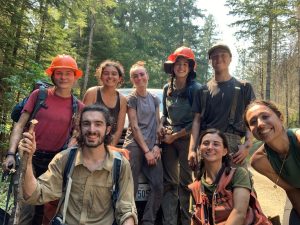
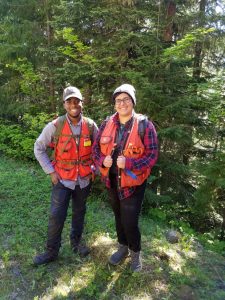
–
Summer 2020
California closed-cone pines (interval squeeze): Frannie Nelson (Colorado College), Kalina Stork (UW), led by grad student Michelle Agne
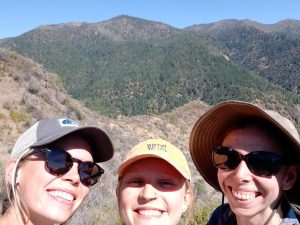
–
Washington fire ecology (east and west side fires): Marwa Mahmoud (UW), Marcela Todd Zaragoza (UW), Michael McNorvell (UW), Allison Phillips (UW), Roni Woodard (UW), Ashley Hillis (UW), Madison Stone (UW), Sienna Patton (UW), Spencer Vieira (Evergreen College), Ben Hagedorn (WWU), led by grad students Don Radcliffe, Madison Laughlin, and Liliana Rangel-Parra
(Photo Coming Soon)
–
Summer 2019
California closed-cone pines (interval squeeze): Madison Laughlin (Northland College), led by grad student Michelle Agne
(Photo Coming Soon)
–
Washington fire ecology (east and west side fires): Sarah Burrington (UW), Hiruni Jayasekera (UW), Michael McNorvell (UW), Hannah Wilson (UW), Spencer Vieira (Evergreen College), Nicole Lau (UW), Madison Laughlin (Northland College), led by grad students Don Radcliffe, Jenna Morris, and Michelle Buonanduci
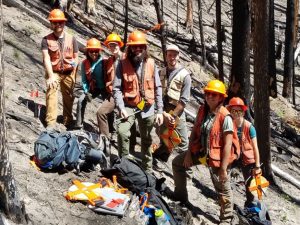
–
Summer 2018
PNW Burn Severity: Jalene Weatherholt (UW), Callie Zender (UW), Peter Walsh (UW), led by grad student Saba Saberi
(Photo Coming Soon)
California closed-cone pines (interval squeeze): Arielle Link (Colorado College), Thadeus Sternberg (UW), led by grad student Michelle Agne
(Photo Coming Soon)
Fraser Experimental Forest, CO: Arielle Link (Colorado College), Thadeus Sternberg (UW), Sahale Riedel (Whitworth University), Aileen Liu (UW), Felicity Carroll (Carleton College), Nicole Lau (UW), led by grad students Michele Buonanduci, Jenna Morris, and Michelle Agne
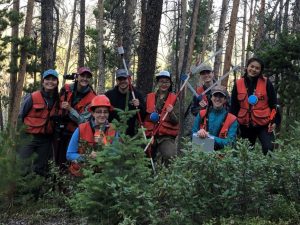
–
Summer 2017
California closed-cone pines (interval squeeze): Joe Fontaine & Billi Weber (visiting scientists from Murdoch University), Joey Hulbert (U. Pretoria, SA), led by grad student Michelle Agne
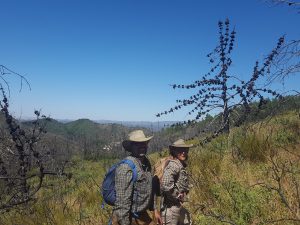
–
Yellowstone: Alexandra Orrego (Georgia State University, led by grad student Saba Saberi and PI Brian Harvey
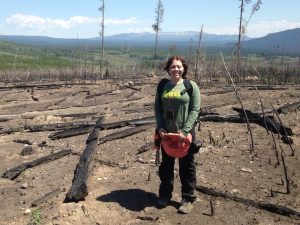
–
PNW Burn Severity: Sarah Salam (UW), Elise Pletcher (UW), Lewis Walden (visiting PhD student from Murdoch University in Australia), led by grad students Saba Saberi and Michelle Agne
(Photo Coming Soon)
